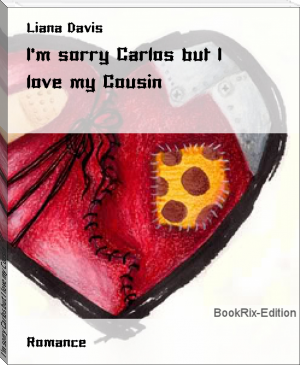Romeo and Juliet by William Shakespeare (beach books txt) 📖

- Author: William Shakespeare
Book online «Romeo and Juliet by William Shakespeare (beach books txt) 📖». Author William Shakespeare
Do I live dead that live to tell it now.
BENVOLIO: Be ruled by me, forget to think of her. ROMEO: O, teach me how I should forget to think.
BENVOLIO: By giving liberty unto thine eyes; Examine other beauties.
ROMEO: ’Tis the way
To call hers exquisite, in question more:
These happy masks that kiss fair ladies’ brows Being black put us in mind they hide the fair; He that is strucken blind cannot forget
The precious treasure of his eyesight lost: Show me a mistress that is passing fair, What doth her beauty serve, but as a note
Where I may read who pass’d that passing fair? Farewell: thou canst not teach me to forget.
BENVOLIO: I’ll pay that doctrine, or else die in debt. [Exeunt.]
SCENE II: A street.
[Enter CAPULET, PARIS, and Servant.] CAPULET: But Montague is bound as well as I,
In penalty alike; and ’tis not hard, I think, For men so old as we to keep the peace.
PARIS: Of honorable reckoning are you both; And pity ’tis you lived at odds so long.
But now, my lord, what say you to my suit?
CAPULET: But saying o’er what I have said before: My child is yet a stranger in the world;
She hath not seen the change of fourteen years, Let two more summers wither in their pride,
Ere we may think her ripe to be a bride.
PARIS: Younger than she are happy mothers made. CAPULET: And too soon marr’d are those so early made.
The earth hath swallow’d all my hopes but she, She is the hopeful lady of my earth:
But woo her, gentle Paris, get her heart,
My will to her consent is but a part;
An she agree, within her scope of choice Lies my consent and fair according voice. This night I hold an old accustom’d feast, Whereto I have invited many a guest, Such as I love; and you, among the store,
One more, most welcome, makes my number more. At my poor house look to behold this night
Earth-treading stars that make dark heaven light: Such comfort as do lusty young men feel
When well-apparell’d April on the heel
Of limping winter treads, even such delight Among fresh female buds shall you this night Inherit at my house; hear all, all see,
And like her most whose merit most shall be: Which on more view, of many mine being one May stand in number, though in reckoning none, Come, go with me.
[To Servant, giving a paper.] Go, sirrah, trudge about
Through fair Verona; find those persons out
Whose names are written there, and to them say,
My house and welcome on their pleasure stay.
[Exeunt CAPULET and PARIS.]
Servant: Find them out whose names are written here! It is written, that the shoemaker should meddle with his yard, and the tailor with his last, the fisher with his pencil, and the painter with his nets; but I am sent to find those persons whose names are here writ, and can never find what names the writing person hath here writ. I must to the learned.—In good time.
[Enter BENVOLIO and ROMEO.]
BENVOLIO: Tut, man, one fire burns out another’s burn- ing,
One pain is lessen’d by another’s anguish;
Turn giddy, and be holp by backward turning;
One desperate grief cures with another’s languish:
Take thou some new infection to thy eye, And the rank poison of the old will die.
ROMEO: Your plaintain-leaf is excellent for that.
BENVOLIO: For what, I pray thee?
ROMEO: For your broken shin.
BENVOLIO: Why, Romeo, art thou mad?
ROMEO: Not mad, but bound more than a mad-man is; Shut up in prison, kept without my food,
Whipp’d and tormented and—God-den, good fellow. Servant: God gi’ god-den. I pray, sir, can you read? ROMEO: Ay, mine own fortune in my misery.
Servant: Perhaps you have learned it without book:
but, I pray, can you read any thing you see? ROMEO: Ay, if I know the letters and the language. Servant: Ye say honestly: rest you merry!
ROMEO: Stay, fellow; I can read. [Reads.]
‘Signior Martino and his wife and daughters;
County Anselme and his beauteous sisters; the lady
widow of Vitravio; Signior Placentio and his lovely nieces; Mercutio and his brother Valentine; mine
Rest you merry!
[Exit.]
uncle Capulet, his wife and daughters; my fair niece Rosaline; Livia; Signior Valentio and his cousin Tybalt, Lucio and the lively Helena.’ A fair assembly: whither should they come?
Servant: Up. ROMEO: Whither?
Servant: To supper; to our house. ROMEO: Whose house?
Servant: My master’s.
ROMEO: Indeed, I should have ask’d you that before. Servant: Now I’ll tell you without asking: my master is the great rich Capulet; and if you be not of the house of Montagues, I pray, come and crush a cup of wine.
BENVOLIO: At this same ancient feast of Capulet’s
Sups the fair Rosaline whom thou so lovest, With all the admired beauties of Verona:
Go thither; and, with unattainted eye, Compare her face with some that I shall show, And I will make thee think thy swan a crow.
ROMEO: When the devout religion of mine eye
Maintains such falsehood, then turn tears to fires;
And these, who often drown’d could never die, Transparent heretics, be burnt for liars!
One fairer than my love! the all-seeing sun
Ne’er saw her match since first the world begun.
BENVOLIO: Tut, you saw her fair, none else being by, Herself poised with herself in either eye:
But in that crystal scales let there be weigh’d
Your lady’s love against some other maid
That I will show you shining at this feast,
And she shall scant show well that now shows best.
ROMEO: I’ll go along, no such sight to be shown, But to rejoice in splendor of mine own.
[Exeunt.]
SCENE III: A room in Capulet’s house.
[Enter LADY CAPULET and Nurse.]
LADY CAPULET: Nurse, where’s my daughter? call her forth to me. Nurse: Now, by my maidenhead, at twelve year old, I bade her come. What, lamb! what, lady- bird! God forbid! Where’s this girl? What, Juliet!
[Enter JULIET.] JULIET: How now! who calls? Nurse: Your mother.
JULIET: Madam, I am here.
What is your will?
LADY CAPULET: This is the matter:—Nurse, give leave awhile,
We must talk in secret:—nurse, come back again; I have remember’d me, thou’s hear our counsel. Thou know’st my daughter’s of a pretty age.
Nurse: Faith, I can tell her age unto an hour. LADY CAPULET: She’s not fourteen.
Nurse: I’ll lay fourteen of my teeth,— And yet, to my teeth be it spoken, I have but four— She is not fourteen. How long is it now
To Lammas-tide?
LADY CAPULET: A fortnight and odd days. Nurse: Even or odd, of all days in the year,
Come Lammas-eve at night shall she be fourteen. Susan and she—God rest all Christian souls!— Were of an age: well, Susan is with God;
She was too good for me: but, as I said,
On Lammas-eve at night shall she be fourteen; That shall she, marry; I remember it well.
’Tis since the earthquake now eleven years;
And she was wean’d,—I never shall forget it,— Of all the days of the year, upon that day:
For I had then laid wormwood to my dug, Sitting in the sun under the dove-house wall; My lord and you were then at Mantua:—
Nay, I do bear a brain:—but, as I said,
When it did taste the wormwood on the nipple
Of my dug and felt it bitter, pretty fool,
To see it tetchy and fall out with the dug!
Shake quoth the dove-house: ’twas no need, I trow, To bid me trudge:
And since that time it is eleven years;
For then she could stand alone; nay, by the rood, She could have run and waddled all about;
For even the day before, she broke her brow: And then my husband—God be with his soul! A’ was a merry man—took up the child:
‘Yea,’ quoth he, ‘dost thou fall upon thy face?
Thou wilt fall backward when thou hast more wit; Wilt thou not, Jule?’ and, by my holidame,
The pretty wretch left crying and said ‘Ay.’
To see, now, how a jest shall come about!
I warrant, an I should live a thousand years,
I never should forget it: ‘Wilt thou not, Jule?’
quoth he;
And, pretty fool, it stinted and said ‘Ay.’
LADY CAPULET: Enough of this; I pray thee, hold thy peace.
Nurse: Yes, madam: yet I cannot choose but laugh, To think it should leave crying and say ‘Ay.’
And yet, I warrant, it had upon its brow
A bump as big as a young cockerel’s stone; A parlous knock; and it cried bitterly:
‘Yea,’ quoth my husband,’fall’st upon thy face? Thou wilt fall backward when thou comest to age; Wilt thou not, Jule?’ it stinted and said ‘Ay.’
JULIET: And stint thou too, I pray thee, nurse, say I. Nurse: Peace, I have done. God mark thee to his grace! Thou wast the prettiest babe that e’er I nursed:
An I might live to see thee married once, I have my wish.
LADY CAPULET: Marry, that ‘marry’ is the very theme
I came to talk of. Tell me, daughter Juliet, How stands your disposition to be married?
JULIET: It is an honor that I dream not of. Nurse: An honor! were not I thine only nurse,
I would say thou hadst suck’d wisdom from thy teat.
LADY CAPULET: Well, think of marriage now; younger than you,
Here in Verona, ladies of esteem,
Are made already mothers: by my count,
I was your mother much upon these years That you are now a maid. Thus then in brief: The valiant Paris seeks you for his love.
Nurse: A man, young lady! lady, such a man
As all the world—why, he’s a man of wax.
LADY CAPULET: Verona’s summer hath not such a flower. Nurse: Nay, he’s a flower; in faith, a very flower.
LADY CAPULET: What say you? can you love the gentle man?
This night you shall behold him at our feast; Read o’er the volume of young Paris’ face,
And find delight writ there with beauty’s pen; Examine every married lineament,
And see how one another lends content And what obscured in this fair volume lies Find written in the margent of his eyes.
This precious book of love, this unbound lover, To beautify him, only lacks a cover:
The fish lives in the sea, and ’tis much pride
For fair without the fair within to hide:
That book in many’s eyes doth share the glory, That in gold clasps locks in the golden story; So shall you share all that he doth possess,
By having him, making yourself no less.
Nurse: No less! nay, bigger; women grow by men. LADY CAPULET: Speak briefly, can you like of Paris’
love?
JULIET: I’ll look to like, if looking liking move:
But no more deep will I endart mine eye
Than your consent gives strength to make it fly. [Enter a Servant.]
Servant: Madam, the guests are come, supper served up, you
called, my young lady asked for, the nurse cursed in the pantry, and every thing in extremity. I must hence to wait; I beseech you, follow straight.
LADY CAPULET: We follow thee. [Exit Servant.]
Juliet, the county stays.
Nurse: Go, girl, seek happy nights to happy days. [Exeunt.]
SCENE IV: A street.
[Enter ROMEO, MERCUTIO, BENVOLIO, with five or six
Maskers, Torch-bearers, and others.]
ROMEO: What, shall this speech be spoke for our ex- cuse?
Or shall we on without a apology?
BENVOLIO: The date is out of such prolixity: We’ll have no Cupid hoodwink’d with a scarf, Bearing a Tartar’s painted bow of lath, Scaring the ladies like a crow-keeper;
Nor no without-book prologue, faintly spoke
After the prompter, for our entrance:
But let them measure us by what they will; We’ll measure them a measure, and be gone.
ROMEO: Give me a torch: I am not for this ambling; Being but heavy, I will bear the light.
MERCUTIO: Nay, gentle Romeo, we must have you dance. ROMEO: Not I, believe me: you have dancing shoes
With nimble soles: I have a soul of lead
So stakes me to the ground I cannot move.
MERCUTIO: You are a lover; borrow Cupid’s wings, And soar with them above a common bound.
ROMEO: I am too sore enpierced with his shaft
To soar with his light feathers, and so bound, I cannot bound a pitch above dull woe:
Under love’s heavy burden do I sink.
MERCUTIO: And, to sink in it, should you burden love; Too great oppression for a tender thing.
ROMEO: Is love a tender thing? it is too rough, Too rude, too boisterous, and it pricks like thorn.
MERCUTIO: If love be rough with you, be rough with love;
Prick love for pricking, and you beat love down. Give me
 Reading books romantic stories you will plunge into the world of feelings and love. Most of the time the story ends happily. Very interesting and informative to read books historical romance novels to feel the atmosphere of that time.
Reading books romantic stories you will plunge into the world of feelings and love. Most of the time the story ends happily. Very interesting and informative to read books historical romance novels to feel the atmosphere of that time.




Comments (0)